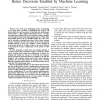954 search results - page 32 / 191 » Learning and prediction of slip from visual information |
IJMMS
2007
13 years 9 months ago
2007
Predicting when a person might be frustrated can provide an intelligent system with important information about when to initiate interaction. For example, an automated Learning Co...
NIPS
2007
13 years 10 months ago
2007
Current computational models of bottom-up and top-down components of attention are predictive of eye movements across a range of stimuli and of simple, fixed visual tasks (such a...
CIKM
2010
Springer
13 years 7 months ago
2010
Springer
Individuals often use search engines to return to web pages they have previously visited. This behaviour, called refinding, accounts for about 38% of all queries. While researcher...
ICDE
2009
IEEE
14 years 11 months ago
2009
IEEE
One of the most challenging aspects of managing a very large data warehouse is identifying how queries will behave before they start executing. Yet knowing their performance charac...
CORR
2006
Springer
13 years 9 months ago
2006
Springer
We investigate here concept learning from incomplete examples. Our first purpose is to discuss to what extent logical learning settings have to be modified in order to cope with da...

